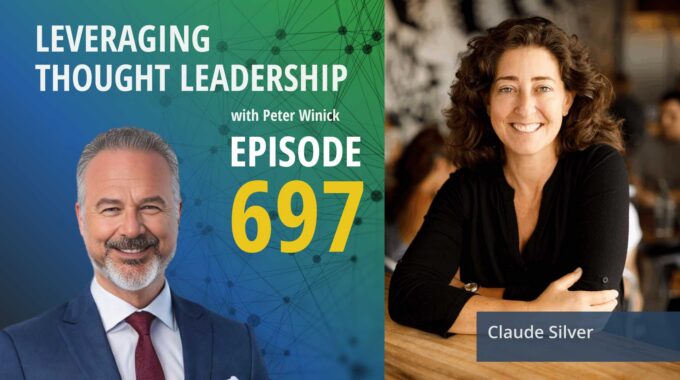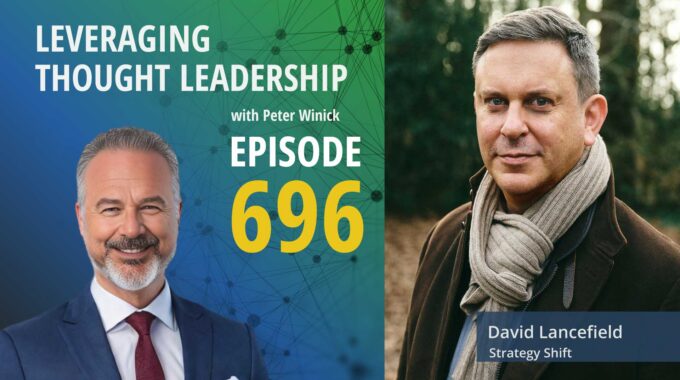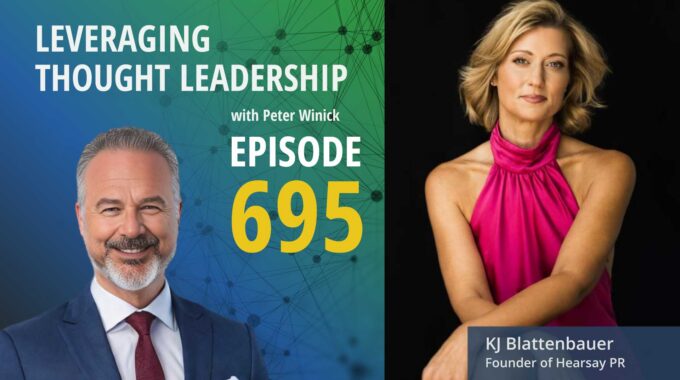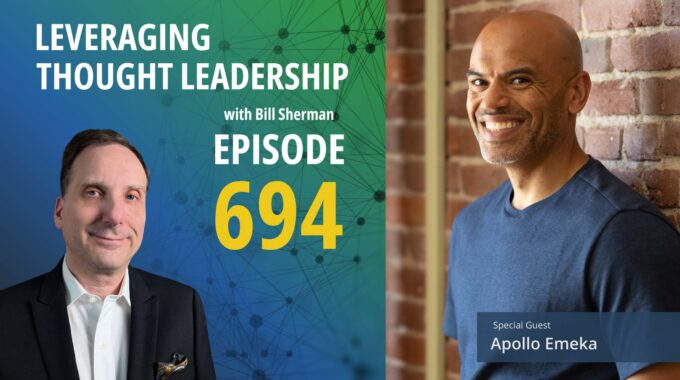Frameworks for connection, accountability, and performance This episode examines how psychological safety drives performance, how…
From Chaos to Chapters: How AI is Revolutionizing Book Publishing | Dan Curran

AI Meets Editorial Expertise to Create Your Story
Discover how Chapters.io is transforming book publishing for first-time authors by blending AI technology with expert editorial guidance. This innovative platform turns conversations into manuscripts, making the writing process faster, easier, and more accessible than ever.
What if publishing your book was as simple as answering a few questions?
This week, Peter Winick speaks with Dan Curran, a serial entrepreneur and innovator who is transforming the publishing industry with Chapters.io, a groundbreaking platform designed to make writing a book accessible and efficient for first-time authors. He’s also the author of the upcoming book Chaos is a Ladder, bringing a wealth of insight from his extensive experience in editorial content and marketing.
Dan shares his journey through healthcare, pharma, and life sciences, writing technical content requiring precision and integrity. For years, he sought a way to revolutionize publishing but couldn’t see the right opportunity—until the launch of ChatGPT in 2022. Recognizing AI’s potential to organize and structure content, he and his team reimagined how non-fiction books could be created, merging cutting-edge technology with traditional editorial expertise.
Chapters is tailored for first-time authors—professionals with wisdom or unique perspectives but unsure how to navigate the challenging publishing landscape. The platform begins with simple, AI-driven questions: What’s your topic? Who’s your audience? What tone fits your message? These answers quickly generate 5,000 to 20,000 words of raw material. Editors then refine the draft, turning conversations into polished manuscripts. The system integrates your existing content—blogs, podcasts, or presentations—while maintaining a closed environment to ensure the work remains entirely yours.
What sets Chapters apart is its human touch. Every project is paired with a best-selling editor who provides insight, asks follow-up questions, and ensures your story shines. This blend of AI efficiency and editorial expertise turns the daunting process of writing a book into an approachable, streamlined experience.
Three Key Takeaways:
Chapters.io makes publishing accessible: By combining AI-driven tools with human editorial expertise, it simplifies the process for first-time authors, turning conversations into compelling manuscripts.
AI as a powerful organizational tool: The platform leverages AI to structure content, ask tailored questions, and fill in gaps, making it easier to generate high-quality material efficiently.
Human touch remains vital: Every project is supported by a best-selling editor who ensures the final product is polished, personalized, and impactful. This blend of technology and expertise redefines the book-writing journey.
Dan is disrupting the publishing industry and he isn’t the only one. If you want to learn more about what Thought Leaders should know about the changing publishing landscape check out this video from Peter Winick.
Transcript
Peter Winick And welcome, welcome, welcome. This is Peter Winick. I’m the founder and CEO at Thought Leadership Leverage. And you’re joining us on the podcast today, which is Leveraging Thought Leadership. Today, my guest is Dan Curran. He’s a serial entrepreneur based in St Louis. He’s had some amazing, innovative contributions to marketing and publishing, and he is now the founder of chapters.io, which is a really creative and interesting new way to publish using voice transcription, and we’ll get into all that soon. But he’s written a book called Chaos is a Ladder that’s going to be published very soon. So welcome aboard today. Dan, how are you?
Dan Curran Amazing. Thank you for having me. And I see you.
Peter Winick Yeah. So you and I were chatting a little while ago and I was became fascinated with the [email protected]. So why don’t you maybe go backwards and give me, give the audience a sense of sort of where you come from, from the publishing side and now what you’re doing with this leveraging the technology and AI and all that, because it’s pretty slick.
Dan Curran Absolutely. So in the last decade or so, I’ve worked in the editorial content space, mostly in marketing and really geeky, what we call dense content technology companies, health care, biopharma, life science. And what that means is that we wrote white papers, blogs for really technical and, you know, subject matter required a lot of editorial integrity and oversight, a lot of inner knowing. And I was always want to be book publisher. I always wanted to get in that space and just didn’t see the opportunity where we could add value. And then when I write, you know, air has been around for a while. But when Chad shipped in November 30th of 2022, obviously our eyes perked up and said, wow, this is something to the whole space of writing. I think we all have our own opinions about that. But we took a contrarian view and looked at A.I. as something that could ask questions, that could organize content, because plagiarism attribution, those are just, you know, those are etched in stone with us. It has to quadrupole digital thought. And we took a look over the fence at book publishing. And when I say book publishing, obviously nonfiction for the context where we’re talking about thought leadership memoirs, how to book what we call big idea book like assets. And we thought, what if we could record, transcribe and just train the large language model to organize it, the content. Is that is that authentic? Is that more authentic than a ghostwriter? And we thought, absolutely. It’s just your raw thoughts. And just because someone doesn’t have the fine motor skills to type or write doesn’t mean they don’t have some brilliance to share.
Peter Winick So that’s a shame there for a second because I love sort of the origin story in that when you’re writing, I love how you call the dense white papers, but there’s this highly technical, heavy, heavy stuff that’s not meant to be read by the typical businessperson leader, manager like a business book would be. What you find in that space often is you’ve got people that have this deep, deep knowledge. But maybe English isn’t a primary language or they’re incredibly technical. They don’t have the writing skills or whatever. So I love that. That’s where you got to the to the root of this early on to say, wait a minute, I’ve done this type of work for years and now you look at chat and say, well, you think to be threatened by it or figure out how to leverage it and utilize it. I think for the most part, a vast majority of folks writing nonfiction business books need some help, whether that’s a ghostwriter organizing their thoughts or its structure, all those sort of things.
Dan Curran Yeah, I mean, I totally agree. And there’s one area you checked all the boxes on, on working with that target audience, you know, like a scientist or, you know, subject matter expert. The other thing is not always, but often they will ruminate too long. You know, they they’re just a perfect genius. Then we get it so that they train. That’s interesting you picked up on because you train muscles to like, okay. To kind of judo move them to say, okay, we have a deadline and let’s get this, get this going. So yeah, so it’s all, you know, it’s just trying to get thoughts from the brain, you know, onto the computer. And, and so that’s, that’s our, our focus is making that easier.
Peter Winick And then the publishing landscape today is really. Interesting slash broken slash opportunities, you know, sit there. Right? So you’ve got everything from sort of the classic vanity press. They’ll publish anything the other end of the continuum or sort of the big the big houses in New York. And then you’ve got the hybrid space, right, which is some of the creativity and innovation is more in the business model than the technology side. So tell me. About who’s the perfect target for chapters.
Dan Curran So we started out and it remains the same. As far as the perfect, is that someone that has something to say that has generally a lifetime of wisdom or a unique perspective. But they’ve been hesitant because of what you just mentioned. You know, you know the vocabulary, I know it. But if you’ve if you’ve built the biggest plumbing supply company in the world and you’re an expert and you want to share your wisdom, you don’t know hybrid or, you know, self-publishing, these things are just confusing as heck. And that’s what we’re trying to do. So to answer your question is that first time author would be our target persona. That person that is wicked smart has something to say. But the industry as a whole has been somewhat of a hot mess or a gatekeeper. And I’ll say someone just asked me this last Friday think, well, there’s too many books and there’s, you know, there’s going to be more bad content out there. And I, I don’t I’m not putting them down for saying it, but I logically I can see where they’re coming from. But my argument to that is, who are you to decide is the democracy, you know, the market, what the market will tell. And by the way, most people it’s what is it, like 5000 books or less or 200 books or less. So it’s a loss leader. It’s for their family. It’s for their business. It’s not necessarily for Amazon. So.
Peter Winick Exactly. So how does it you know, when you said that somebody that’s got. Wisdom. When you and I talk, you talk about some of the ways that’s documented that it gets fed into the system. So give me an example then. Like how does it work?
Dan Curran So yeah, the most complicated part is really this me talking about it here. It’s very, very simple. We just start off with questions and we are recording. We have a beautiful interface and big fat buttons. They can, they can video, audio and it starts off with questions you would assume we would ask, What do you want to write about? Who’s it for? What tone? And then from there, they I will customize those questions. And really, what we’re doing is front loading the traditional process. So you’re getting the five, ten, 20,000 plus words really quick. So in our system, so an editor can start helping that that person, you know, Polish and saying the edges. So it’s really a Q&A session over a couple of months is how it works. And that’s generally most of the content. The other content is if they have written blogs or they’ve been on podcasts like this or white papers, we also throw that into I’m holding up a copy right now. We’re throwing it to the specs and all that vessel is doing is, is it doesn’t know. The outside world can’t plagiarize it made it’s been trained to organize and what I think is the most spectacular part of it is it’s been trained to ask for gaps in the story. So if you’re telling a story, a book you skimmed over a bad partnership you had or bankruptcy it back up, it’ll say, hey, add some more color to that.
Peter Winick If you’re enjoying this episode of Leveraging Thought Leadership, please make sure to subscribe. If you’d like to help spread the word about our podcast, please leave a five-star review at ratethispodcast.com/ltl and share it with your friends. We’re available on Apple Podcasts and on all major listening apps as well as at ThoughtLeadershipLeverage.com/podcast.
Peter Winick So if you if you’re an author, an academic, a keynote or a thought leader, etc., part of what you’re feeding it is that person’s personal stuff, whether it’s blog, whether it’s video, whether it’s whatever they’ve got. You know, particularly today, everybody’s stuff is far more documented outside of a book than inside of a book, typically. Yeah. Usually done. So you’re feeding it all that. So it’s so it’s learning. So it sounds to me like you. The shorthand for this is really you’ve democratized and improved on the ghostwriting process.
Dan Curran I think so. I mean, I think if you’re an A-plus ghostwriter, you have nothing to worry about. But it is an odd relationship. But, you know, it’s a force rating and it’s over a period of months. Sometimes it takes a couple of years and hours, weeks. You know, it’s. And what I what I love. What is special about us? I it’s not like there’s not can be other people are going to train these models. But I really love about chapters as we assign a bestselling editor to the process. So I call them kind of the adults in the room. So no matter how alpha you are, as of right this later, you probably are the editors going to be, Hey, come back, let’s get more vulnerable here. Let’s be a little bit more transparent here. So and then they’ll find that you’ve not.
Peter Winick Totally automated this system because there have been these models out there of booking a box or whatever they are. And I’m not I’m not mentioning specific name where, you could, you know, send us a recording every day for five minutes and we’ll turn it into a book. Yeah. To your point earlier, you’re going to turn it into a crappy book because there’s not a lot of thought effort. And it’s not that the world doesn’t need more books. It needs more good books. Like, I don’t if I buy a book and I start to read and I don’t like it, I’m like, okay, there’s 25 bucks down the drain. Who cares? I’m not going to give you 6 or 8 hours of my time if you’re not engaging me.
Dan Curran Right. Yeah. It just wouldn’t happen without the human in the loop. Just even hearing you talk about just when it makes sense that. Why not? You have like, a NFL coach right there with years of knowledge. Would you not want that person to, you know, kind of kick the tires and tell you, you know, share their perspective on the book, could take a different direction.
Peter Winick And to go back on what you said about the ghostwriting side, not to think ghostwriters, I’ve got a lot of friends that are ghostwriters and there are like any other field, really, really good ones, a lot of mediocre ones and a couple terrible ones. What I know from my work over the years is that when a ghostwriting relationship falls apart and oftentimes, they do, it’s rarely because the client says, You know, I heard Dan to be my ghostwriter and actually he’s a really horrible writer. It’s really that it’ll be something like the schedule doesn’t sync, right? You know either the client those kind of pushed things up and now the timing doesn’t work. The personalities don’t sync, you know. He reminds me of my fifth-grade history teacher and he just annoys me. And then even to go out, the styles don’t vibe or the author is putting a burden on the on the ghost. That’s just silly. Well, you’re not finding my voice. Well, you’re not. You don’t have a voice, right? Yeah. You there. So I love that the technology you can just keep going at it and going at it until you kind of get it to a place.
Dan Curran Yeah, I think and quite frankly, hearing you say that a few more than a few of our editors are ghost writers too, but they’re they like, again, we’re front loading it. You have you’re not taking two months to get an outline. You’re getting it all at once. Far from being perfect, but that the book, like you said earlier, already exist. It’s just in their head or it’s disparate all over in blogs and so forth. So we’re just gathering, we’re gathering, organizing and putting it in that vessel so the real magic can happen.
Peter Winick So do you see this as a competition against certain publishing models and or opening up the opportunities to there’s a whole other population of folks that never would have written before, and we’re making it faster, better, easier or cheaper, Or is it both?
Dan Curran I think it’s both. I’m still digesting this industry. It’s remember, it kind of came from market. You know, now I’ve immersed myself, so I’ve met all the publishers, all the founders, and no one’s dumb. They’re all smart. But it is definitely at an inflection point. I think that it’s great for, if not me, someone else. So it’s a great disruptive, chaotic time. So I think I think a big thing we all have to remember is most these books, the less than 1% are making at a Barnes, though it’s really either vanity and nothing is wrong with that. You should leave or like, see, it’s for your business. It’s for sales. And then maybe it’ll have organic and viral growth.
Peter Winick And part of the tension today it elevated is that the alignment between the author and the publisher financially, time wise, energy, effort, etc., except for very, very few. There’s a rare moment in time where everybody is aligned, right? Because you could be a whatever, an attorney in Cleveland that wants to write a book that’s never going to be a national bestseller because your objective is to be the best attorney in Cleveland, right? So the publisher can only put so much effort into that, right? Because they’re building it back. Okay. If that sells a thousand copies, The attorney, on the other hand, goes, I don’t care how many I sell. The objective is I’d like to pick up five new clients a year from this. This is a multi-million dollar value proposition for me. Over time, those two you can’t square those two circles, right like that. They’re never going to be aligned.
Dan Curran Yeah, but they try it. Yeah I they try. Yeah. Absolutely.
Peter Winick Yeah. So I mean they try and you know, a lot of the hybrid publishers realize, okay, well if that’s never going to be high volume then I’m in the services business and I got to just, you know, make a lot of money from the author as the client, whether they sell 50 books or 5000, it is what it is. And you can’t blame them for that. They got to make a living, right. They can’t take all the risks on that. So I think that the technology’s always going to be aligned right. Like it doesn’t have a motive or it doesn’t have.
Dan Curran A right that right. It does not have a motive. Like you said, I there’s a benefit from not knowing a lot about book publishing, too, that we can just go forward and try to just democratize it and make it easier for people to share their knowledge. So the more I talk to the traditional publishers and I try to back away sometimes because I’ll let them fight their fight and get their, you know, percentage of book sales and over inflate the author’s optimism of what could happen. You know that that’s. You know.
Peter Winick Will stay there a second, because I think for most folks, when they’re writing a book, when they get into what I would call sort of the publishing industrial complex, there’s a lot of folks there and I don’t think they’re being intentionally deceitful couple here and there, you know, between the publishers and ghostwriting and then PR and, you know, all the supporting services and stuff where people can go, Wow, I’m going to be the next Hemingway or this is really going the rock and roll or whatever. And then you talk to some of those folks six months, nine months later, and they’re kind of bummed out. Not sometimes financially. They took a big hit. Like, well, that was 100 grand I could have spent elsewhere. But more about the deflation of the hopes. I had a message I wanted to get out and it sold 200. So I love the early on calibration of what is realistic.
Dan Curran Yeah. And I. I don’t know hundreds of successful they mean before this this business hundreds of successful nonfiction business writers but I know dozens and dozens and the ones that have done well I mean they work hard and it wasn’t the publisher. It was that I that really they if they were speakers, they started out speaking free. And then they went to 5000 and now they’re 15,000. And I’m telling you, the control is what the author and it’s elbow grease. But and you know, there are good publishers out there. You know, I reform all the time. You need to talk to 3 or 4 and then you’ll find it’s like a club.
Peter Winick But even the big houses today, when they’re when they’re vetting an author, it used to be, you know, 80, 90% on their content, the power of the ideas, etc., and 10% on their distribution, their ability to sell a book. I would argue that’s almost flip today. We mediocre stuff getting published because someone’s got a zillion followers on LinkedIn, Twitter, Insta, whatever, and the publishers doing the math going, there’s a conversion rate for every, you know, gazillion people. I have an insta. How many books gets old? So that person comes with a built in sales system. And I’m saying if you’re that person, why do you need a quote, partner that’s taking 80, $0.85 on the dollar? That doesn’t seem equitable to me.
Dan Curran Well, I imagine I don’t know that in the music industry, but I imagine it’s identical. Like, yeah, you can be a TikTok star and finish, you know, figure out a way to put more money in your pocket. But those people are hustlers, you know, they in a good way. I mean, they really go out and they believe they have something to say. Do I think there’s another Simon Sinek or Seth Godin out there that’s just purely just intimidated by this industry 100% and bet that those people will, you know, that stuff or cream will rise to the top.
Peter Winick Yeah, well, it’s been great. I appreciate you sharing what you’re doing and I think it’s really, really interesting and I think it’s something everybody should be taking a look at and watching out for is how we integrate the technology tools in today to change the publishing world. That needs a little bit of changing.
Dan Curran So thanks for that and I’d love to. Anyone I love to talk about this at 60,000ft beyond just chapters, just the evolution of the space. So yeah, Thank you so much.
Peter Winick To learn more about Thought Leadership Leverage, please visit our website at ThoughtLeadershipLeverage.com. To reach me directly, feel free to email me at Peter at ThoughtLeadershipLeverage.com. And please subscribe to Leveraging Thought Leadership on iTunes or your favorite podcast app to get your weekly episode automatically.





